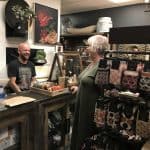 Ready for some help with your business? You can research online all day, read every book, even talk with friends and family, but sometimes you just need another experienced business person to sit down with you, face to face, and work on improving your business. No matter where you are, odds are that you are in the territory of some free business consulting sources.
Ready for some help with your business? You can research online all day, read every book, even talk with friends and family, but sometimes you just need another experienced business person to sit down with you, face to face, and work on improving your business. No matter where you are, odds are that you are in the territory of some free business consulting sources.
These first two are more or less consistent nationwide in the US. No matter where you are, you can call on the nearest of these services.
- Small Business Development Centers. Our Contributor Jeanne Cole (OkieJ) works for the SBDC based in Alva, Oklahoma. Her job, along with all SBDC counselors, is to provide free business counseling to anyone who asks. She helps people in any stage of business, and she drives halfway across the state to meet with people on their own turf. Trust me, there is an SBDC and the local equivalent of Jeanne near you waiting to help, probably based on a college campus. Check the SBDC Locator to find yours.
- SCORE.Through SCORE, volunteers with real business experience can help you fix problems in your business. SCORE has lots of chapters in the US, but they are pretty far apart in my corner of the state. If you are matched with a volunteer that does not meet your needs, speak up and ask for a change.
This second group of resources is more general. The names and programs will vary from place to place, so you have to do more research to find them in your area. The best place to start is:
- Universities, Colleges, Technical Centers. Many educational institutions have some program or center dedicated to small business. The services available vary widely. You’ll just have to call and find out what’s available to you. Even if you are not near the campus, you are probably still in the service area of some help, and they may drive out to meet you. Don’t be afraid to call the statewide universities and see what they can offer.
- Business Incubators. All incubators provide services to the businesses that they house. Some also provide assistance to outside businesses. It never hurts to ask. Some incubators worldwide are listed at the NBIA. Some incubators now offer co-working in addition to traditional incubation.
- Trade Associations. Depending on the type of business you are in, you may get some help from a trade group or business alliance. They also may be able to help you connect with another small business person in your industry, but not a direct competitor, for some in person discussions.
- Chamber of Commerce. The local chamber of commerce may have their own business counseling program, or may point you to other local resources. They should know all the other players in your local market. If you local town chamber is too small to help much, try the next bigger neighboring city.
- Economic Development Associations. This could be a city agency, a county group, or a regional or state organization, but some offer help directly to existing business owners.
- State Business, Commerce, or Economic Development Department. This is usually an agency of the state government, so start looking on your state’s government website. In order to get in-person help from the state, you may need to be a pretty large business. More likely, they may help you find a more local resource person.
- Utility Companies. Many utilities offer some economic development programs, loans or other services to new businesses. Look especially for local or regional electric or telecommunications utilities that are cooperatives. Call them up and ask about their economic development.
I’ve given you several options, because I know that personal help is only as good as the person offering it. If you don’t get the help you need from one person or one source, keep looking.
Hiring Paid Consultants
Besides these free resources, there are also paid consultants to help with your business. Here’s where I need your help. For the next article on hiring paid consultants, I need your experiences.
- Have you worked with a paid consultant? What were your results?
- Are you a consultant? What can you share about working with client small businesses?
Special thanks to Sheryl Schuff and Derrick Parkhurst for their help with this post.
New to SmallBizSurvival.com? Take the Guided Tour. Like what you see? Get our updates.
- About the Author
- Latest by this Author
Becky started Small Biz Survival in 2006 to share rural business and community building stories and ideas with other small town business people. She and her husband have a small cattle ranch and are lifelong entrepreneurs. Becky is an international speaker on small business and rural topics.











I have worked with consultants a couple of times. Fortunately, I’ve had very good results with them.
Actually, I hired them for a small project. He’s about to start the third one for us…. and there is a fourth coming his way.
How did I find them? Word of mouth.
Thanks, Marco. Glad to have your perspective on consultants.
We use a number of consultants at http://www.rombla.com most of the time it works out ok but sometimes there time is short lived. Word of mouth is always best but we use craigslist, twitter and google to find specific talents.
I have been a consultant to small businesses and found that the best engagements are short (1-2 weeks) and address or diagnose a specific problem (specific deliverable).
Chris and Geno, thank you. Good points to consider.
Great Resource. In our small town the resources you’ve listed go largely under used. Getting the word out is key. It seems the chamber really makes an effort. Many small business owners, I think have the I can do it attitude and look for help only as a last resort.
That’s our independent streak. But it does not serve us or our businesses well to only view this as asking for help. This is more about learning, growing, improving. And that’s a different perspective.
Becky,
The advice I’d like to offer to help folks work effectively with their consultants is that rarely is there one “correct” answer to any given problem. It’s the consultant’s job to ask questions about your particular situation in an effort to come up with a competent solution that meets your objectives.
It’s been my experience that people often think that their quick questions should have quick answers. Not always true. For example, the one I get a lot is “Do I need an attorney to incorporate (or form an LLC) or can I do it myself?”
Well, it depends. On a lot of things. And there are several other questions that need to be answered first in order to choose the most appropriate legal structure.
Some of the areas that need to be discussed are what types of products and services you offer, what locations you have, and whether you sell anything on-line. Details about your personal life, like marital status, health, educational plans, and current net worth are also important because of the effects that choice of business structure has on your personal taxes.
There is no one-size-fits-all answer. The advice that your 25 year old single cousin in Key Largo got three years ago when starting a similar business might not be the best advice for you if you’re a 40 year old married father with two kids in middle school in Ft. Wayne.
It doesn’t matter whether the subject is incorporating your business, developing a marketing plan, or producing a newsletter for your customers. An experienced consultant who knows what questions to ask can be a big help to you in finding a workable solution.
Sheryl
Thanks, Sheryl! Excellent, well-thought-out points.